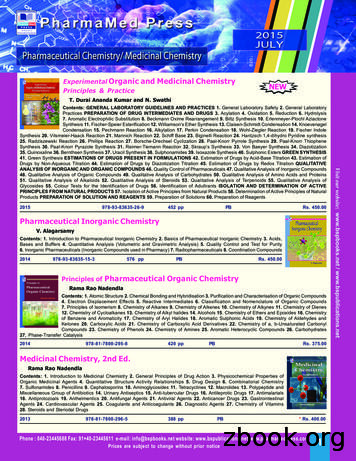School Of Chemistry - University Of Bristol
School of ChemistryComplete University Guide 2020Times Good University Guide esearchQuality rham3.315Liverpool55.6bristol.ac.uk/chemistry
School of ChemistryProf Mike Ashfold FRSProf Varinder Aggarwal FRSProf Richard Evershed FRSProf Stephen Mann FRSProf Andrew Orr Ewing FRSbristol.ac.uk/chemistry
School of ChemistryIUPAC 2019 Distinguished Women inChemistry Awardbristol.ac.uk/chemistry
School of Chemistry The breadth and quality of facilitiesavailable for carrying out chemistryexperiments is outstanding. World-class instrumentation is used byundergraduate students.bristol.ac.uk/chemistry
School of Chemistry You will be taught by world-leading academics. You will undertake a project with a staff memberof your choice in the final year of your course.bristol.ac.uk/chemistry
School of Chemistry An integrated approach, where staff and studentsthrive on the synergy between world-class researchand first-class teaching. A commitment to excellent teaching by all academicstaff. Development of new methods of teaching thatfacilitate and enhance learning.bristol.ac.uk/chemistry
School of Chemistry92%The teaching onmy course91%Organisation andManagement77%Assessment stry
School of ChemistryTeaching excellenceYou will be taught by chemists who write today’s textbooks:Professor Jonathan Claydenbristol.ac.uk/chemistry
School of ChemistryFor many years metalphosphine π-bonding wasthought to use phosphorusd-orbitalsResearch carried out hereshowed that bonding occursthrough orbitals with a largeamount of p-characterMetal-phosphine catalysts are key to many industrial processesbristol.ac.uk/chemistry
School of ChemistryPhosphorus YlideA very useful reaction: forms a new C C double bond– For many systems the geometry of the resulting double bond is cis(R groups are on same side of the double bond)– How do we get double bonds with trans-geometry?bristol.ac.uk/chemistry
School of ChemistryStabilised ylides give trans products (R groups on oppositesides of molecule)Mechanism elucidated at Bristol by Aggarwal & Harvey 2005bristol.ac.uk/chemistry
School of Chemistry Flipped classroom Peer-assisted study sessions Online learning resources– Training videos for labs– Lecture capture– Bespoke distance learning for year-away students.bristol.ac.uk/chemistry
School of Chemistry State of the art teachinglaboratories used exclusivelyby chemistry students Award-winning DynamicLaboratory Manual A unique teaching experiencebristol.ac.uk/chemistry
School of ChemistryStudy abroad and industrialplacements: Mentoring and support providedthroughout your year away Distance learning delivered throughthe DLM Current home/EU students enjoy an85% discount on year-away tuitionfeesbristol.ac.uk/chemistry
School of ChemistryResearch and Teaching Work in a research labalongside PhD students andresearch associates Work as an undergraduateambassador in a local schoolbristol.ac.uk/chemistry
School of Chemistry Choose project from 5 research themes Catalysis & Synthesis Chemical & Synthetic Biology Computational Chemistry, Theory and Dynamics Environment & Energy Functional Molecules and Nanomaterials Or choose an educational project Work as an undergraduate ambassador in a local school Develop new teaching within the School of Chemistrybristol.ac.uk/chemistry
School of Chemistry Personal tutor Senior tutor Student wellbeing advisors Professional support instudent residences Dedicated healthcareservice Disability supportbristol.ac.uk/chemistry
School of Chemistry85% of chemistry students graduated with upper-second or first-classhonours in 2019.bristol.ac.uk/chemistry
School of Chemistry86% of our 2017graduates were inwork or educationsix months aftergraduationFull time workFull time educationPart time work oreducationTravelUnemployedOtherDestinations of Leavers fromHigher Education Survey 2017,response rate 90%bristol.ac.uk/chemistry
School of ChemistryBristol physical science graduates earn more than most of theirRussell Group peers at all points after graduation.*Median Earnings For Physical Science Graduates 32,000 30,000University of Bristol 28,000 26,000Russell Group 24,000 22,000 20,0001 year aftergraduation3 years aftergraduation5 years aftergraduation*Longitudinal Education Outcomes Survey, Department for Education 2017bristol.ac.uk/chemistry
School of Chemistry UnitDX– science incubator hub– set up by Harry Destecroix(former PhD student) Ziylo– Founded by Prof. Tony Davis– Recently acquired by NovoNordisk in a deal worth up to 800mbristol.ac.uk/chemistry
School of ChemistryOutstanding TeachingGlobally Leading Researchbristol.ac.uk/chemistry
85% of chemistry students graduated with upper-second or first-class honours in 2019. School of Chemistry bristol.ac.uk/chemistry Full time work Full time education Part time work or education Travel Unemployed Other 86% of our 2017 graduates were in work or education six months after graduation Destinations of Leavers from Higher Education Survey 2017, response rate 90%. School of Chemistry .
Chemistry ORU CH 210 Organic Chemistry I CHE 211 1,3 Chemistry OSU-OKC CH 210 Organic Chemistry I CHEM 2055 1,3,5 Chemistry OU CH 210 Organic Chemistry I CHEM 3064 1 Chemistry RCC CH 210 Organic Chemistry I CHEM 2115 1,3,5 Chemistry RSC CH 210 Organic Chemistry I CHEM 2103 1,3 Chemistry RSC CH 210 Organic Chemistry I CHEM 2112 1,3
Physical chemistry: Equilibria Physical chemistry: Reaction kinetics Inorganic chemistry: The Periodic Table: chemical periodicity Inorganic chemistry: Group 2 Inorganic chemistry: Group 17 Inorganic chemistry: An introduction to the chemistry of transition elements Inorganic chemistry: Nitrogen and sulfur Organic chemistry: Introductory topics
CHEM 0350 Organic Chemistry 1 CHEM 0360 Organic Chemistry 1 CHEM 0500 Inorganic Chemistry 1 CHEM 1140 Physical Chemistry: Quantum Chemistry 1 1 . Chemistry at Brown equivalent or greater in scope and scale to work the studen
Accelerated Chemistry I and Accelerated Chemistry Lab I and Accelerated Chemistry II and Accelerated Chemistry Lab II (preferred sequence) CHEM 102 & CHEM 103 & CHEM 104 & CHEM 105 General Chemistry I and General Chemistry Lab I and General Chemistry II and General Chemistry Lab II (with advisor approval) Organic chemistry, select from: 9-10
High School Chemistry is often a student’s first exposure to chemistry. You may not even be sure what “chemistry” really is. Many High Schools and Colleges are now requiring students to take High School Chemistry. This series will introduce you to the basic concepts and problem solving included every High School Chemistry Course, typically a two-semester class. Learning chemistry is .
From one of these Colorado public four-year institutions Adams State University [B.S. Chemistry] Colorado Mesa University [B.S. Chemistry] Colorado State University-Ft Collins [B.S. Chemistry] Colorado State University-Pueblo [B.S. Chemistry] Fort Lewis College [B.S. Chemistry; Chemistry option] Metropolitan State University of Denver
Chemistry is the science that describes matter, its properties, the changes it undergoes, and the energy changes that accompany those processes. Inorganic chemistry Organic chemistry Physical chemistry Biochemistry Applied Chemistry: Analytical chemistry, Pharmaceutical Chemistry, . Istv an Szalai (E otv os University) Lecture 1 6 / 45
Chemistry of Cycloalkanes 13. Chemistry of Alkyl halides 14. Alcohols 15. Chemistry of Ethers and Epoxides 16. Chemistry of Benzene and Aromaticity 17. Chemistry of Aryl Halides 18. Aromatic Sulphonic Acids 19. Chemistry of Aldehydes and Ketones 20. Carboxylic Acids 21. Chemistry of Carboxylic Acid Derivativ






















